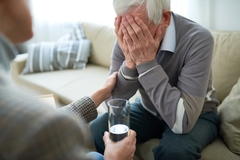
Grief is a strong and sometimes overwhelming emotion that someone may feel after a loss. It is the natural and common reaction to the death of a loved one or major life change. It is important to know grief and depression are not the same. Understanding the difference can help families suffering from grief cope with a loss.
Life changing events bring grief
Everyone experiences a loss at some point throughout their life whether it be a loved one, a pet, a home, or a friend. Losses are life changing events that can come with or without warning. They can also be physical things such as loss of something important, loss of a home, and loss from natural disasters. Even losing a home as a result of moving into an assisted living facility can be a difficult experience. It is important to remember there is no exact time period for grieving. Everyone grieves differently and the grieving processes depends on many factors in a person’s life.
The stages of grief
An individual moving from their home to an assisted living facility might be daunting for some and bring grief. Deciding what to pack or bring, what to sell, and going through old memories in a home can trigger very harsh emotions. These emotions can sometimes even be compared to the death of a spouse, loved one, or a friend. Both situations are major changes which bring stress and emotions.
A healthy grieving process has a series of stages which an individual will pass through. The five stages of grief include:
- Denial
- Anger and guilt
- Struggling to find meaning or answers
- Feeling overwhelmed and helpless
- Acceptance
The way a person moves through these stages may differ from situation to situation due to the amount of support the person grieving has. It is important to know, rushing the grieving process rarely works and people can grieve for up to a year. Although a year may seem like a concerning amount of time, this is normal. On birthdays, anniversaries, and holidays there are also potential for relapses, which can bring strong emotions of grief, even for those who have gone through the stages and acceptance.
Relapses shouldn’t last long, but they are normal. However, if these relapses are not brief, it may have transitioned into depression.
The difference between depression and grief
It may be extremely difficult to know when grief has evolved into depression due to them having similar symptoms at the start. According to PyschologyToday, when grief doesn’t resolve into acceptance and the person experiencing grief doesn’t return to some kind of normalcy, that is a sign of depression.
According to mayoclinic.org, depression is a serious mood disorder that causes feelings of sadness, loss of interest in things and affects the way you feel, think and behave. Symptoms include:
- Feelings of sadness, hopelessness or emptiness
- Frustration and outbursts of anger over even the small things
- Loss of interests in activities once enjoyed
- Change in sleeping patterns including insomnia or over sleeping
- Lack of energy
- Weight changes, reduced appetite, weight loss or over eating
- Anxiety and restless feelings
- Trouble concentrating, thinking and focusing and remembering things
- Feeling guilt, worthless or self-blaming
- Suicidal thoughts
- Unexplained pain or illnesses
Someone who is grieving will feel sad and emotions such as anger or guilt, but they can also be comforted by friends and family as well as kind memories. A person suffering from depression will not feel comfort and instead turn things around into self-blame. Seek help for yourself or your loved one if symptoms of depression are apparent.